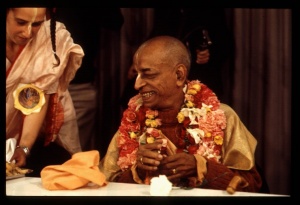SB 1.13.39

A.C. Bhaktivedanta Swami Prabhupada
TEXT 39
- yudhiṣṭhira uvāca
- nāhaṁ veda gatiṁ pitror
- bhagavan kva gatāv itaḥ
- ambā vā hata-putrārtā
- kva gatā ca tapasvinī
SYNONYMS
yudhiṣṭhiraḥ uvāca — Mahārāja Yudhiṣṭhira said; na — do not; aham — myself; veda — know it; gatim — departure; pitroḥ — of the uncles; bhagavan — O godly personality; kva — where; gatau — gone; itaḥ — from this place; ambā — mother aunt; vā — either; hata-putrā — bereft of her sons; ārtā — aggrieved; kva — where; gatā — gone; ca — also; tapasvinī — ascetic.
TRANSLATION
Mahārāja Yudhiṣṭhira said: O godly personality, I do not know where my two uncles have gone. Nor can I find my ascetic aunt who is grief-stricken by the loss of all her sons.
PURPORT
Mahārāja Yudhiṣṭhira, as a good soul and devotee of the Lord, was always conscious of the great loss of his aunt and her sufferings as an ascetic. An ascetic is never disturbed by all kinds of sufferings, and that makes him strong and determined on the path of spiritual progress. Queen Gāndhārī is a typical example of an ascetic because of her marvelous character in many trying situations. She was an ideal woman as mother, wife and ascetic, and in the history of the world such character in a woman is rarely found.